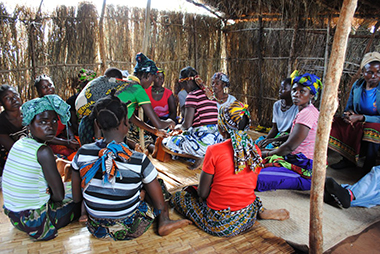In 2013 alone, donors pledged $31 billion to support financial inclusion programs—an attempt to deliver financial services to the two billion adults who do not have access to such services. In the past, microcredit and insurance programs received all of the attention, but improving the savings capacity of the poor and unbanked has recently drawn increasing attention as well.
Microsavings programs are quickly gaining traction due to the advent of innovations that lower implementation costs and growing evidence of the positive benefits of microsavings. Advances in mobile money technologies and insights from behavioral economics, such as SMS reminders and commitment devices, are driving innovations in the design of microsavings programs, allowing for low-cost access.
Access to a savings account has been shown to improve account holders’ overall financial situation and their ability to cope with shocks. In addition, access to savings may also lead to greater educational aspirations and completion of additional years of schooling for the children of account holders.
A complete evaluation of the welfare benefits of microsavings programs should also account for the indirect effects, or spillovers, on the social and financial networks in which individuals are embedded. In Nepal and Malawi, some positive spillovers have been documented. We study the effects of access to savings on a type of financial network where negative spillovers are most likely: one’s risk-sharing network.
In risk-sharing arrangements, as with many informal institutions, trust makes up for the absence of written binding contracts. Access to savings can reduce this trust, because it increases the incentive to break one’s promise to provide support.
Using data from vulnerable women in Kenya, we have undertaken the first study to document the negative effect of access to savings on risk-sharing. In Kisumu, Kenya, we randomly assigned participants to treatment and control groups. The treatment included enrollment in a mobile money savings account, a session in which women set savings goals, and the receipt of weekly SMS reminders about these goals. Several months after the intervention, we find that access to the microsavings program reduced transfers received and sent between risk-sharing pairs.
The effect is strongest between those pairs who initially shared less risk, and between those pairs where one individual but not both had access to the program. These findings imply that the trust problem in risk-sharing arrangements might be mitigated either by the higher social value of the relationship or by providing access to savings to all members of a risk-sharing network.
Our results suggest that formal financial inclusion programs can undermine existing informal institutions. Interventions aimed at strengthening trust in existing informal institutions may be a useful endeavor, such as projects to support Village Savings and Loans Associations (VSLAs) in Mali and informal burial associations (IDDIRs) in Ethiopia.
While we document that the microsavings program reduced transfers within one’s risk-sharing network, we cannot conclusively say whether reduced transfers lead to negative welfare impacts among risk-sharing partners. We find no negative impacts on the food security of network members. It may well be that the negative effect on risk-sharing may be too small relative to the full portfolio of risk-coping strategies, and as such the net effect on food security is zero. Indeed, our intervention helped women to build rather small buffer stocks. It remains an open question whether microsavings programs that enable individuals to build much larger buffer stocks would impact the welfare of one’s risk-sharing network.
Similar to many other microsaving programs discussed above, the intervention in our study did have direct benefits to program recipients, such as an increase in liquid savings. Overall, the gains to microsaving programs are likely to outweigh the consequences of reductions in risk-sharing. Nonetheless, improvements in program design could be achieved by identifying possible welfare losses and minimizing such losses if they exist.
Felipe Dizon is a PhD Candidate in Agricultural & Resource Economics at UC Davis. Erick Gong is an Assistant Professor of Economics at Middlebury College. Kelly Jones is a Research Fellow in the Markets, Trade, and Institutions Division (MTID) at IFPRI.







